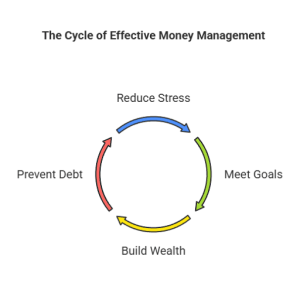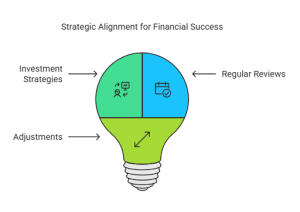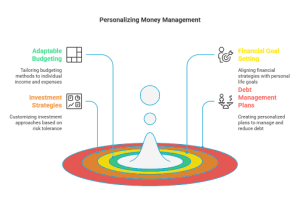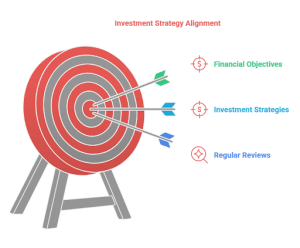Just imagine how relaxed you would be when you check your bank statements at the end of the month! While many struggle to take charge of their finances, you don’t have to be one of them. Incorporating money management tips is an excellent way to achieve financial freedom and stability.
This guide offers strategies to help you improve your financial literacy and put you in charge of your financial destiny—from the simplest budgeting methods to more sophisticated investment options.
Why Manage Your Money?
The reasons to manage your money wisely are nearly endless. Here are some of them:
- Reduces Anxiety: Wise money management reduces stress by planning for both regular and unexpected expenses.
- Allows Meeting Financial Goals: Strategic planning and Budgeting may allow you to achieve personal and professional financial milestones.
- Builds Wealth: Something as simple as early and prudent investing of money can multiply your net worth over time.
- Avoids Debts: When appropriately executed, smart Budgeting helps you avoid overspending and fosters responsible use of credit.
- Improves Financial Knowledge: Budgeting can sharpen your understanding of loans, investments, and savings.
- Emergency Cash Reserve: An emergency fund guarantees financial security for unexpected circumstances.
- Guaranteed Financial Freedom in Retirement: You can secure financial freedom in your golden years through long-term investments.
- Improves Quality of Life: Financial independence lets you enjoy life while still achieving your money goals.
- Builds Generational Wealth: Proper planning helps you pass on assets and financial support to the next generation.
- Charitable Giving: Being financially stable allows for giving to charities—both for personal gratification and tax incentives.
 Laying the Foundation – Understanding Money Management
Laying the Foundation – Understanding Money Management
What is Money Management?
Money management includes Budgeting, savings, investments, and spending. It is crucial to achieving financial stability and securing one’s future.
Why Manage Your Money?
Good money management reduces stress, helps meet financial goals, and builds wealth. Bad management leads to debt and missed economic opportunities.
Assessment of Financial Situation
Start by understanding your current financial situation—know your income, expenses, and debts. Use tools such as budget trackers to see where your money goes.
Further, incorporate cash storage techniques and options for earning interest from the bank. Good cash storage techniques enable the security and liquidity of your funds, while earning interest on bank credits can supplement your income stream.
 Essential Money Management Tips for Beginners
Essential Money Management Tips for Beginners
Creating a Budget
A budget is your financial blueprint. There are several methods to consider:
- 50/30/20 Budgeting: Allocate 50% of income to needs, 30% to wants, and 20% to savings.
- Zero-Based Budgeting: Every dollar is assigned a specific role, from bills to savings, ensuring you know exactly where your money is going.
Table: Budgeting Method Comparison
| Method | Description | Best For |
| 50/30/20 Budgeting | Simple allocation based on a percentage of income | Beginners who want simplicity |
| Zero-Based Budgeting | Every dollar has a job | Detailed trackers and planners |
Tracking Your Spending
Track every dollar to understand your spending habits. Consistency is key in using a basic spreadsheet or an advanced app.
Setting Financial Goals
Establish financial goals that are clear and purposeful, in line with the SMART criteria. These goals greatly assist in building an emergency fund or saving for retirement because they provide clarity on what is to be done.
The Power of Saving Early
The sooner you start saving, the more you will reap the benefits of compound interest. Small yet regular contributions can vastly magnify over time.
Advanced Money Management Strategies
Managing Debt
Understanding debt management is crucial for financial wellness. The debt snowball or avalanche method can help you pay off debt faster.
Basics of Investment
Investing can increase your wealth. Stocks, bonds, and mutual funds are common options. It is very important to understand risk and diversification.
Tax Optimization
Tax breaks and IRA/401(k) accounts can improve financial status. Consulting a tax professional provides more personalized input.
Estate Planning
Estate planning ensures that your assets will be handled as you desire after you pass on. It is a key part of financial planning.
The Psychology of Money
Your Relationship With Money
Your beliefs and emotions about money influence your financial decisions. Identifying and understanding these triggers can help you make better choices.
Changing Your Spending Habits
Develop a strategy to conquer impulse spending and replace negative behaviors with positive ones. Balancing emotions in spending is crucial for financial balance.
Dealing With Financial Stress
Financial stress is everyday but manageable. Various techniques and professional help can provide support in coping.
 Leveraging Technology and Tools
Leveraging Technology and Tools
Budgeting Apps
Here are some top-rated budgeting apps that can help streamline your financial management:
Recommended Budgeting Apps:
| App Name | Features | Price | Website |
| Mint | Tracks expenses, budgets, bills | Free | Mint |
| You Need a Budget (YNAB) | Detailed budgeting, goal tracking | $84/year | YNAB |
| PocketGuard | Simplifies budgeting and finds savings | Free/Paid | PocketGuard |
Investment Platforms
Ambitious but doable online investment platforms suitable for specific goals with a structured support framework.
Other Helpful Tools
Explore other tech avenues like expense trackers for easy money management and automatic bill payments.
Personalization in Money Management
Customizing Strategies
Tailor strategies to fit your financial position and goals for successful money management.
Upwardly Mobile Budgeting
Create a budget that allows regular variations to remain viable and relevant.
Regular Financial Reviews
Conduct monthly or quarterly financial assessments to keep your goals on track while making necessary adjustments.
 Unique Perspectives on Money Management
Unique Perspectives on Money Management
Emergency Funds
Understand the importance of an emergency fund and how to build one for financial security.
Reduction in Recurring Expenses
Implement measures to cut down on regular bills and subscriptions to increase savings.
Ethical Investing
Invest in companies that align with your values, considering the impact of your investments on society and the environment.
Aligning Money and Values
Reflect on how your values influence your financial decisions. Aligning them can increase satisfaction and effectiveness in money management.
Handling Financial Setbacks
Prepare for unexpected financial setbacks with strategies that ensure resilience and stability.
 Conclusion
Conclusion
This guide provides a basic overview of Budgeting and ready-to-use tools for everything from lending management to current investing practices.
Be proud! Now is the time to plan a budget with set goals and track your spending.
Choose one of the methods given in this guide and put it into practice. Start working gradually yet indeed towards a totally independent life. GET ON THIS!



